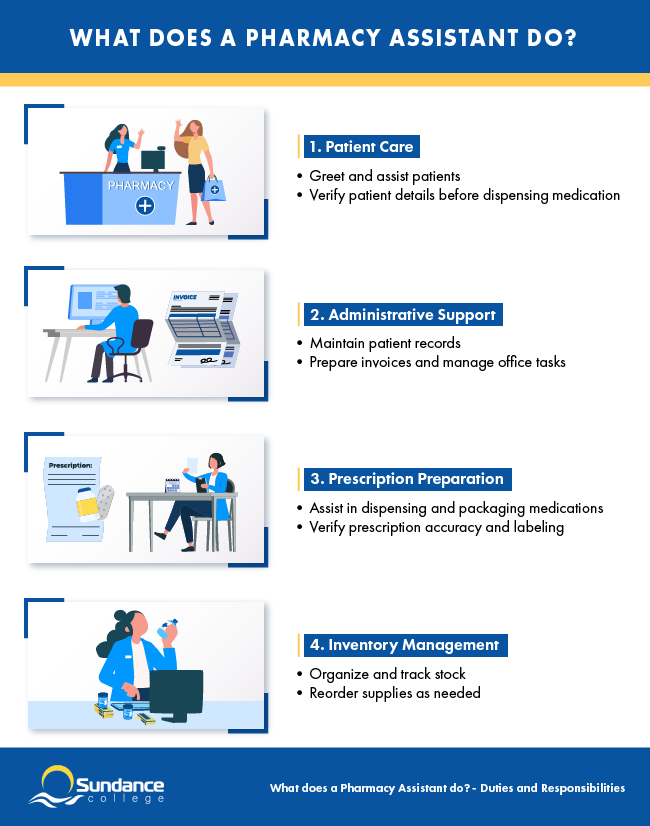Blog / What does a Pharmacy Assistant do? – Duties and Responsibilities
What does a Pharmacy Assistant do? – Duties and Responsibilities

Pharmacy Assistant Diploma
- Retail Pharmacy Assistant
- Hospital Pharmacy Assistant
- Central Fill Dispensary Assistant
- Pharmaceutical Business Development Assistant
Table of Contents
When you visit a pharmacy, the person assisting with over-the-counter drugs and prescriptions is often a pharmacy assistant. They work closely with pharmacists and pharmacy technicians, managing tasks such as processing prescriptions, handling inventory, and maintaining patient records. Their contributions are essential to the day-to-day pharmaceutical operations.
To gain more insight into their work, let’s explore the role of a pharmacy assistant in detail.
Listen to: What does a Pharmacy Assistant do? – Duties and Responsibilities
What is the Role of a Pharmacy Assistant?
Pharmacy assistants support pharmacists in providing patients with the medications and guidance they need. They manage a range of tasks, from assisting with prescriptions to handling inventory, contributing to the pharmacy’s ability to safely serve its community.
Their responsibilities often include counting medications, labeling prescriptions, and restocking shelves. Pharmacy assistants also take care of administrative tasks, such as answering phones, updating electronic records, and operating the cash register.
Here’s a closer look at the key pharmacy assistant duties and responsibilities:
Duties and Responsibilities of a Pharmacy Assistant

1. Patient Care
As a Pharmacy Assistant, you are often the first point of contact for the patient – the friendly face that greets them when they come to collect their prescription. Often, you are dealing with people who are ill or are in pain, so it is important to always be professional, helpful, and kind.
The Pharmacy Assistant is the liaison between the pharmacist and the patient, so having strong interpersonal skills is an asset. Because you deal with many people throughout the day, you, as the Pharmacy Assistant, need to pay close attention to the patients you are communicating with – it is vital that a patient’s name and personal details are verified before any medication is handed over. When dealing with prescription drugs there is no room for mistakes.
2. Administrative Support
A Pharmacy Assistant is in charge of the daily administrative duties. Creating patient records is perhaps the most important administrative function you perform, because it ensures the safe transfer of medication from pharmacist to patient.
Additionally, the Pharmacy Assistant is responsible for the following:
- Preparing patient invoices
- Updating drug and doctor information in pharmacy computer systems
- Writing internal memos
- Ordering and organizing office inventory
- Coordinating callbacks on behalf of the pharmacist
3. Prescription Preparation
As a pharmacy assistant, you always work under the general supervision of a pharmacist. This means helping the pharmacist dispense drugs and fill prescriptions by measuring, compounding, packaging, and distributing the medications. You also play a role in mixing ingredients including creams, powders, ointments, capsules.
Maintaining prescription accuracy is a key part of the role, which involves reviewing prescriptions for completeness and correctness. After the pharmacist’s final checks, it’s your responsibility to type and print labels, package the prescription, and prepare it for payment and patient pickup.
4. Inventory Management
As a Pharmacy Assistant, the responsibility of managing inventory falls to you. To maintain organization, you must ensure a strict system is followed so that all new stock is recorded and put away in its appropriate place. You also need to be on top of counting inventory and knowing when a new order needs to be placed. Having stocked shelves and ample products is a necessity, and this requires organization and planning skills on the part of the Pharmacy Assistant.

Are Pharmacy Assistants Healthcare Workers?
Yes, pharmacy assistants qualify as healthcare workers. They support pharmacists by managing prescriptions, organizing inventory, and assisting customers. Their work directly impacts patient care and medication safety.
Unlike clinical healthcare workers, such as nurses or aides, pharmacy assistants focus on tasks like dispensing medications, processing prescriptions, and maintaining records. In comparison, clinical roles involve direct patient care, monitoring, and rehabilitation.
While pharmacy assistants don’t provide hands-on care, their role is crucial in delivering accurate medications and supporting overall pharmacy operations.
Is Pharmacy Assistant a Good Career?
Pharmacy assistants have a promising career path, especially with an aging population driving the demand for prescription medications in Canada. This steady need makes it a secure and reliable field. With training that can be completed in under a year, you can quickly begin working in this growing sector.
The role offers opportunities across various settings, such as retail pharmacies, hospitals, and long-term care facilities. It combines responsibilities like assisting pharmacists, managing inventory, and preparing medications. Salaries typically range from $40,000 to $60,000 annually, with potential for advancement as you gain experience or take on supervisory duties. A career as a pharmacy assistant provides stability and a meaningful way to contribute to healthcare.
Pharmacy Assistant Job Scope and Requirements
As mentioned, pharmacy assistants take on a combination of administrative, customer service, and technical tasks. They use pharmacy software, follow regulations, and maintain patient confidentiality throughout their work. The role demands attention to detail, the ability to multitask, and a sense of responsibility. Pharmacy assistant qualifications typically include completing a diploma program, which provides the necessary training and knowledge for the role.
Sundance College’s Pharmacy Assistant Diploma provides the skills and knowledge you need in just 43 weeks. You’ll learn pharmacology, Kroll software, inventory management, anatomy, and pharmacy procedures, along with essential communication skills. The program also includes a 7-week practicum, offering pharmacy assistant training in retail, institutional, or long-term care pharmacies to help you succeed. To find out more about Sundance College’s Pharmacy Assistant program, connect with an admissions advisor today.
Related Blogs
Subscribe for more career advice
Blog Categories
Share on:
